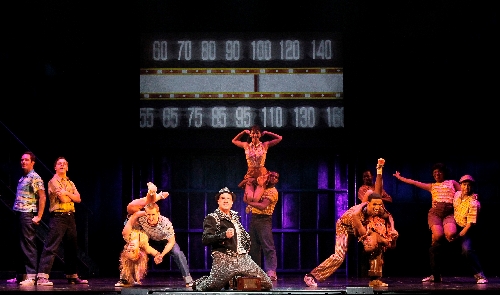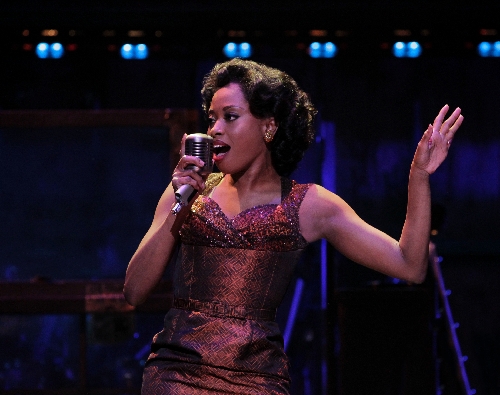‘Memphis’ blends love story, rousing music


Don’t touch that dial.
Not when you can tune in the Tony-winning musical "Memphis," which hits The Smith Center’s Reynolds Hall stage Wednesday for an eight-performance run.
The Broadway original may be winding down – it’s scheduled to close Aug. 5, after almost three years and more than a thousand performances – but the national tour, now in its second year, will keep "Memphis" on the road well into 2013.
The tour started last October in (where else?) Memphis itself, setting up a life-imitates-art situation for cast members appearing at Memphis’ Orpheum Theater – in a show with a finale set at Memphis’ Orpheum Theater.
But the show’s themes reverberate far beyond its namesake city, according to the performers at the heart of "Memphis," which won four Tonys, including the big one for best musical.
The show, set in the 1950s, focuses on white disc jockey Huey Calhoun (played by Bryan Fenkart), who falls for black music in general – and black singer Felicia Farrell (Felicia Boswell) in particular, at a time and in a place where their romance puts their lives in danger.
"I feel I really understand her story," says Boswell, who notes that she and her "Memphis" character share far more than a first name.
"We’re both from the South," she explains. "We both grew up singing gospel music. We both date outside our race. And we both believe people should have the right to be who they are – and be respected and loved for who they are."
Boswell cites one more "Memphis" connection: the show’s reference to civil rights icon Rosa Parks, who happens to be Boswell’s cousin.
Boswell’s too young to remember much about Parks, but "I knew she was great." She recalls Parks "spending time at my grandmother’s house," she says, where "my sisters and I sang for her a lot."
Being from Montgomery, Ala., Boswell heard plenty of stories from family members about their struggles during the civil rights era.
"That wasn’t my reality," she acknowledges, but "it’s necessary we remind people of how far we’ve come – and that we have so much more to learn."
Of course, it doesn’t hurt that "Memphis" explores such sobering themes to an irresistible, can’t-stop-dancing beat, courtesy of the Tony-winning score by Joe DePietro and David Bryan. (If the latter’s name sounds familiar, maybe it’s because he’s a founding member of, and keyboardist for, Bon Jovi.)
As one of the rousing musical numbers promises, "So turn the volume up now! Let the music have its say! Ain’t no use holdin’ back – the rhythm’s gonna get you, the rhythm’s gonna get you, the rhythm’s gonna get you anyway!"
That infectiously rhythmic score plays a major role in "Memphis’ " appeal, Fenkart says.
Unlike recent jukebox musicals, which feature scores made up of familiar pop tunes (think ABBA and "Mamma Mia!" or "Jersey Boys’ " Four Seasons hits), "Memphis" boasts a score "completely and totally original and written for the stage," he points out. "It’s fresh – and people were craving that."
In addition, reaction to the show depends on where the tour’s playing, Boswell and Fenkart suggest.
"Culturally, everyone’s different," Boswell says, noting that "when we were in Toronto, (audiences) didn’t respond to the racism as much as when we were in North Carolina."
And Fenkart recalls that audiences "went crazy in Des Moines," but in Naples, Fla., "where the median age is, like, 106, they were quiet – but they were there."
He attributes "Memphis’ " broad appeal to the fact that "the show has a lot of elements combined into one."
For one thing, "it’s historical fiction," he explains, and "the older generation was alive during that time."
Add "a real young, hungry, energetic cast," with "all this sexy, frenetic dancing" and a "nice rock sensibility," and "Memphis" emerges as a something-for-everyone show, Fenkart maintains.
Not that he’s doing much of the dancing.
"It’s supposed to look awkward for me," Fenkart says of Huey.
The character is loosely based on Dewey Phillips, a white Memphis disc jockey whose radio show featured both black and white singers, including a young hopeful named Elvis Presley. (In an on-air interview, Presley told Phillips which high school he attended, thereby alerting listeners in segregated Memphis to the fact that he was white, even though some thought he sounded black.)
Fenkart describes Huey – whose on-air catchphrase is the cheerfully nonsensical "Hockadoo!" – as "a pinball" who "bounces from one thing to the next."
But while Huey is "not a bright guy in the book-smart sense," Fenkart says, he triggers "an accidental revolution" – bringing black and white teens together through rock ‘n’ roll – because "he is doing what he believes in, and what is in his heart."
And heart, Boswell adds, remains "Memphis’ " essential ingredient – the quality that links the show’s "beautiful love story" with its "amazing music."
As she advises prospective audiences: "You’ll laugh, you’ll cry, you’ll be moved – and you’ll be standing on your feet at the end."
Contact reporter Carol Cling at ccling@reviewjournal.com or 702-383-0272.
Preview"Memphis"
7:30 p.m. Wednesday, 2 and 7:30 p.m. Thursday; also 7:30 p.m. July 20, 2 and 7:30 p.m. July 21-22
Reynolds Hall, Smith Center for the Performing Arts, 361 Symphony Park Ave.
$27-$141 (702-749-2000, thesmithcenter.com)












